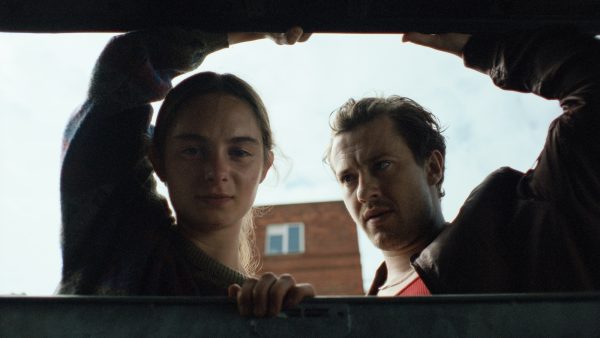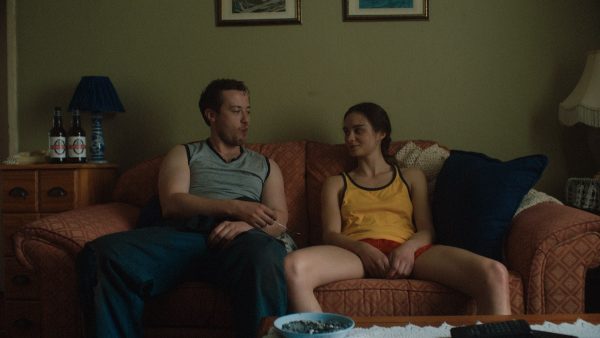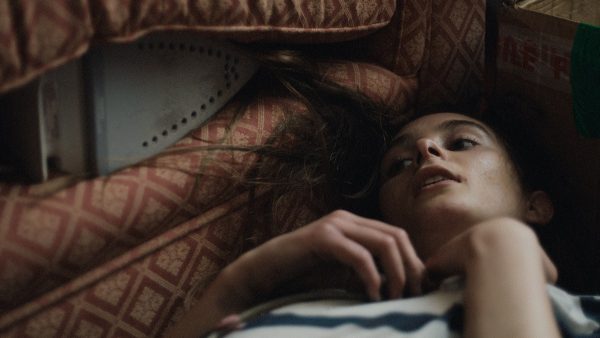Hoard, 2024.
Written and Directed by Luna Carmoon.
Starring Saura Lightfoot Leon, Joseph Quinn, Hayley Squires, Lily-Beau Leach, Deba Hekmat, Samantha Spiro, Cathy Tyson, Nabil Elouahabi, Alexis Tuttle, James Cooper, Tim Bowie, Ceara Coveney, Pena Iiyambo, Sandra Hale, Honey Makwana, Petra Markham, Sam Retford, and Frankie Wilson.
SYNOPSIS:
The story follows Maria – a teenager whose mother used to be a hoarder. Now (set in the 90s) she lives in a foster home where a previous resident Michael inspires her to revisit her childhood memories and passions that she has repressed.
Writer/director Luna Carmoon’s highly personal Hoard is loaded with unquestionably strange imagery, which also goes for after the prologue featuring the titular hoard. The film doesn’t necessarily morph into something else beyond that point but transitions into a years-later story examining repressed idiosyncrasies that have been passed down from generation to generation. And while it sounds somewhat clichéd to explore such generational quirks and how people generally inherit the best and worst traits of their parents, this is a film that drives that metaphor home in a startlingly odd sequence. Then again, film is captivating in its oddness and committed performances, game enough to go anywhere Luna Carmoon dares them to.
Before reaching that point, Hoard explores Maria’s childhood (played by Lily-Beau Leach with the proper nuance, confusion, and naivety for someone in this dynamic) living with her packrat single mother Cynthia (Hayley Squires) technically in a home, but more a mountain of trash that has made maneuvering around practically impossible. The production design here is impressive (courtesy of Bobbie Cousins), with every frame filled with junk in a darkened space. Some of it catches the eye, as some of it does become memories for Maria when we catch up with her having just finished high school, but primarily, the filmmakers exceptionally capture a unique inner world that is simultaneously fascinating and harmful.
Maria is ostracized at school and bullied since the whole school is aware of her mom’s unorthodox behavior, which momentarily causes some flashing at home. However, Cynthia remains successful at keeping up the illusion that this is a storybook paradise. That is until a slight tragedy occurs around Christmas, bringing child services in to take Maria away. It’s also important to note that Cynthia’s unhealthy condition is treated with dignity and that she isn’t vilified here; she is merely an unwell person, sadly unfit to care for Maria.
Flashing forward roughly seven years into the 1990s, Maria is now played by Saura Lightfoot Leon (an arresting turn for the character work and bold physical material she tackles). She is still living with her foster home guardian, Michelle (Samantha Spiro), and entering a new stage of life with some uncertain direction. Some peers also notice that her hygiene becomes an afterthought as soon as school ends, perhaps as a repressed psychological response to this freedom. However, she does have a best friend for some additional support. That friend is then sent away for the summer once her father finds out about some rebellious behavior, with Joseph Quinn’s Michael, once taken in and looked after by Michelle, coming back for a reunion and to sort some other affairs out.
Despite Michael being almost 30 years old, partnered up, and about to be a father, an intense, bizarre attraction develops between them, mostly stemming from habits left over from their biological parents. In other words, they express intimacy not necessarily through sexual intercourse (although that does happen) but with trash and food. Sometimes, it’s as simple as smearing it over one another; other times, it involves dripping it into each other’s hands, mixing it up, and then eating it. To say that the gross is an obvious statement, but it is unexpectedly tender and moving to watch such odd displays of affection.
What ensues is two people who should not be in love with one another (and Maria does occasionally push back) spiraling into the worst versions of themselves, with the adultery aspect looming over this connection. Accentuating some of this behavior is that Maria’s mother has died, with the ashes having been sent to her. Hoard remains abnormally compelling until some of the more conventional dynamics and arcs start playing out in the third act, which is also somewhat dragged out. At over two hours, the toxic attraction also wears down some patience, typically because some even stranger isolated segments are a mystery in themselves, not to mention a subplot about a rapist on the prowl that doesn’t add up to anything.
However, Hoard is a strikingly singular bonkers vision that simultaneously feels uncomfortable, romantic, and unhealthy within the same peculiar scenes. Generally, a weird movie has at least one scene that’s difficult to forget; Luna Carmoon offers several here, crafting a strangely alluring story that could only come from real-life experience.
Flickering Myth Rating – Film: ★ ★ ★ / Movie: ★ ★ ★ ★
Robert Kojder is a member of the Chicago Film Critics Association and the Critics Choice Association. He is also the Flickering Myth Reviews Editor. Check here for new reviews, follow my Twitter or Letterboxd, or email me at MetalGearSolid719@gmail.com















